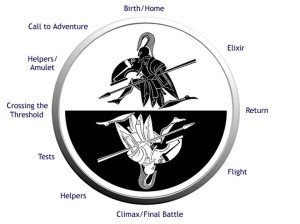by Fitz | Oct 12, 2015 | Create, Journal, Rubrics, Write
 The hero cycle is not a rubric created for storytellers; it is the primal urge of all people—across ALL cultures—to experience within their own lives the transformation of being a hero. Every ancient culture that has had its history recorded has some epic poem or story to guide its people. The heroic cycle represents the power of hope over despair; it gives us all the chance for redemption—even in the hardest of times. It is a recognition that without agnos (pain) there is no aristos (glory), and, in that sense, it validates even the most common and hard-bitten of lives by making the lives of every man, woman and child that has ever lived uncommon, unique, and worthwhile.
The hero cycle is not a rubric created for storytellers; it is the primal urge of all people—across ALL cultures—to experience within their own lives the transformation of being a hero. Every ancient culture that has had its history recorded has some epic poem or story to guide its people. The heroic cycle represents the power of hope over despair; it gives us all the chance for redemption—even in the hardest of times. It is a recognition that without agnos (pain) there is no aristos (glory), and, in that sense, it validates even the most common and hard-bitten of lives by making the lives of every man, woman and child that has ever lived uncommon, unique, and worthwhile.
It is not an absurd idea to recognize the greatness and possibilities of our own lives. It is not absurd to think we have an epic tale worth telling, and it is certainly not absurd to examine every experience through a reflective lens and to start to appreciate the implications of transformation which heroic poetry represents. As human beings, we are hard-wired to need this epic poetry. We can’t just read the epic as a story and move on. We have to know the story and build and incorporate the allegory into our own lives; otherwise, we will run from the battles of life; we will avoid the straits of Skylla and the lair of the Cyclops; we will shun the Gods who come disguised to us and coddle the children given to us; we won’t shed tears for common friends, and we will lock out every stranger and blame our mishaps and misdeeds on the gods.
In short, we will not be remembered, and no songs will be sung about us. The saddest part is that you may think this is all exaggeration and hyperbole. But, it is not! Our lives are full of stories that use and embody the heroic cycle. In fact, I have a hard time trying to think of any “great” movie, book, or story that in same way, shape or fashion
Try to come up with a book or movie that you feel is a meaningful and powerful story that follows this heroic cycle. Fill in the blank boxes with a brief description of the scenes that best illustrate the use of the hero cycle in the story.
The assignment will be posted on iTunes U. If you have any problems, you can use this rubric. Open it in Pages.
Download the rubric:
Heroic Cycle Rubric
by Fitz | Oct 6, 2015 | Create, Journal, Reflect, Write
 It seems like somethings is always obscuring view. My eyes try to wrap around the gnarled trunks of swamp maple lining this river. My poor students are somewhere between lost, aggravated and confused. What is the river to them? Perhaps it is just a string of water: cool because it is fall, or maybe just cool because I we are not in class. Or are we. I usually feel a bit boxed in in the classroom, while outside my mind does not wander, it embraces what is impossible to embrace: these woods, waters, bogs and trails that crisscross this, my childhood home. I wonder what great disservice I would do to my students if I simply opened the door of the classroom and pointed them toward this river and said, “Go, explore, think, write and learn what those woods have to teach. Come back to me in June and tell me of your time!” Nature makes me make promises I seldom keep. I don’t come back as often enough as I say I will. And that ain’t right.
It seems like somethings is always obscuring view. My eyes try to wrap around the gnarled trunks of swamp maple lining this river. My poor students are somewhere between lost, aggravated and confused. What is the river to them? Perhaps it is just a string of water: cool because it is fall, or maybe just cool because I we are not in class. Or are we. I usually feel a bit boxed in in the classroom, while outside my mind does not wander, it embraces what is impossible to embrace: these woods, waters, bogs and trails that crisscross this, my childhood home. I wonder what great disservice I would do to my students if I simply opened the door of the classroom and pointed them toward this river and said, “Go, explore, think, write and learn what those woods have to teach. Come back to me in June and tell me of your time!” Nature makes me make promises I seldom keep. I don’t come back as often enough as I say I will. And that ain’t right.
Later… It was great fun making our way down to the river. Really, so much of my childhood was spent cavorting up and down the river with friends and often alone and old canoes and rowboats. It is something we should continue doing throughout the year. I hope that you got something out of our trip today that is just a little bit different than you would get in the normal class day. I know we only spent a short time sitting by the river, stepping over gnarled roots, and lifting our feet high enough to avoid the poison ivy, but we’ll know that in a day or two:) I hope you were able to get a few thoughts down yourself that you can expand upon tonight or tomorrow and craft into a journal entry that you can savor years from now. Most of my old journals are lost, and it is one of the true sole regrets of my life. Memories are great, but the ravages of decades of time take its toll on true remembrance. And this is what I am trying to give you: the chance, the opportunity, and the time to create your own remembrances of a blessed time in your lives. What you make of this opportunity is up to you. A good writer writes “fully,” meaning, he or she crafts words that are recreated in the mind with the imagery rich and exacting, with nuanced thoughts articulated
And this is what I am trying to give you: the chance, the opportunity, and the time to create your own remembrances of a blessed time in your lives. What you make of this opportunity is up to you. A good writer writes “fully,” meaning, he or she crafts words that are recreated in the mind with the imagery rich and exacting, with nuanced thoughts articulated with clarity and energy, and with actions and sounds pulsing with the original force. This is not something that just happens. It is painstaking work sometimes; other times the words flow as if from a flooded spring. But it is always worth it. Try to get your two journal entries posted to your blog before class on Thursday. I am eager to read them and share in your evolution as a writer and thinker. If you have pictures, post them too! I always had a pad of paper and a pen and rather horrible sketching skills. Do you remember what the sassafras leaf looked like? The Virginia Creeper? Can you remember the white pine from the red pine? The oak from the maple? And what of the burrs and scratches you were probably covered in? All time is
Do you remember what the sassafras leaf looked like? The Virginia Creeper? Can you remember the white pine from the red pine? The oak from the maple? And what of the burrs and scratches you were probably covered in? All time is
All time is important time. Remember time in words, not hours.
Remember time in words, not hours.
 The hero cycle is not a rubric created for storytellers; it is the primal urge of all people—across ALL cultures—to experience within their own lives the transformation of being a hero. Every ancient culture that has had its history recorded has some epic poem or story to guide its people. The heroic cycle represents the power of hope over despair; it gives us all the chance for redemption—even in the hardest of times. It is a recognition that without agnos (pain) there is no aristos (glory), and, in that sense, it validates even the most common and hard-bitten of lives by making the lives of every man, woman and child that has ever lived uncommon, unique, and worthwhile.
The hero cycle is not a rubric created for storytellers; it is the primal urge of all people—across ALL cultures—to experience within their own lives the transformation of being a hero. Every ancient culture that has had its history recorded has some epic poem or story to guide its people. The heroic cycle represents the power of hope over despair; it gives us all the chance for redemption—even in the hardest of times. It is a recognition that without agnos (pain) there is no aristos (glory), and, in that sense, it validates even the most common and hard-bitten of lives by making the lives of every man, woman and child that has ever lived uncommon, unique, and worthwhile. 
Recent Comments